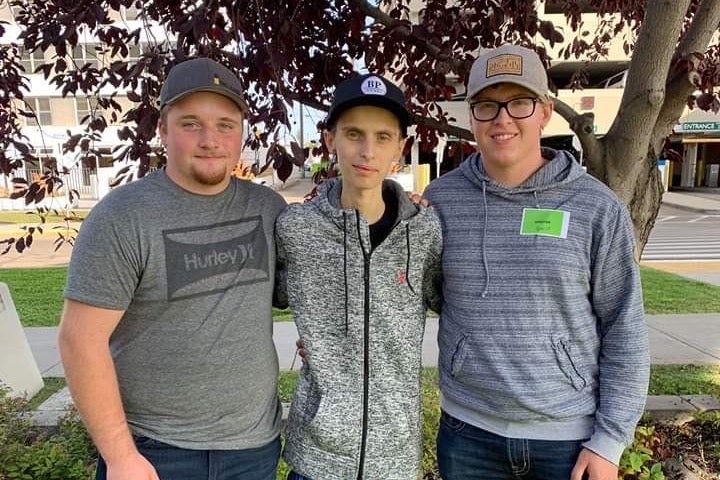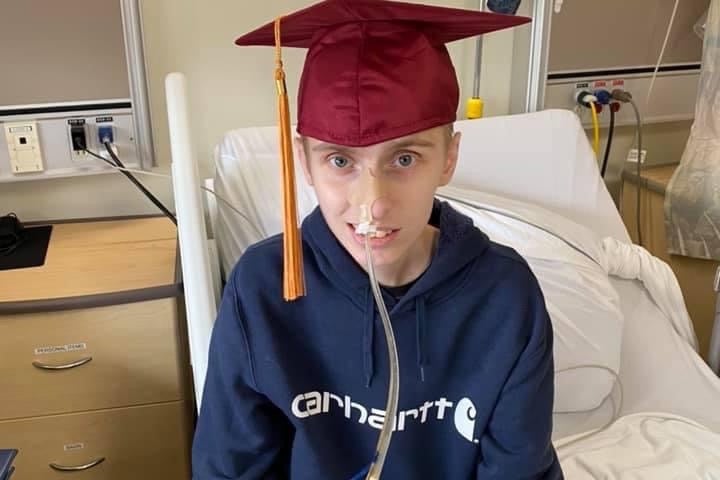Canadian man explains why he is planning on assisted suicide at 20 years old
Last month, Eric Coulam held a farewell barbecue that was attended by 600 people
Your support helps us to tell the story
From reproductive rights to climate change to Big Tech, The Independent is on the ground when the story is developing. Whether it's investigating the financials of Elon Musk's pro-Trump PAC or producing our latest documentary, 'The A Word', which shines a light on the American women fighting for reproductive rights, we know how important it is to parse out the facts from the messaging.
At such a critical moment in US history, we need reporters on the ground. Your donation allows us to keep sending journalists to speak to both sides of the story.
The Independent is trusted by Americans across the entire political spectrum. And unlike many other quality news outlets, we choose not to lock Americans out of our reporting and analysis with paywalls. We believe quality journalism should be available to everyone, paid for by those who can afford it.
Your support makes all the difference.A 20-year-old Canadian man who has decided to pursue medically assisted dying revealed that he would require six organ transplants to survive, and even then, would only have a 50 per cent chance of recovering.
Eric Coulam, a resident of Fort St John in British Columbia, recently hosted a farewell barbecue to bid a final goodbye to his friends and relatives.
Mr Coulam has decided to use Canada’s Medical Assistance in Dying (Maid) law that would help end his life painlessly with drugs administered by a doctor or a nurse.
“There’ll be an end to suffering. I suffer all day long. I’ve been in a four-walled room for a very long time and I’ve just had enough,” he told CJDC-TV.
Mr Coulam spent most of his childhood taking medication for abdominal pain to treat an unknown gastrointestinal condition. In the last two years, this condition has cost him his small bowel, led to liver and kidney disease, chronic pain and innumerable infections.
Doctors have been unable to diagnose the condition that has plagued him for nearly a decade even though he has gone to seven different hospitals across Canada and consulted specialists from across the country.
His health condition took a turn for the worse two years ago when his doctors discovered a blockage. He became so sick that he needed emergency surgery to remove a part of his lower intestine.

He went into septic shock after a part of the intestine ruptured.
“I went in to emergency and got a bed right away and that night [it] ruptured and [I] got put in a coma for I can’t remember how long.”
He said doctors were still unable to figure out why his condition was deteriorating and he was sent from Fort St John to Dawson Creek and then several other hospitals before returning to Fort St John.
He says he was finally told by doctors that his only chance of recovery was getting six different organ transplants, which he says has never been previously attempted.
He was also told that there is only a 50 per cent chance of recovery, and it was this revelation that led him to eventually opt for medically assisted death. But it was “hard to tell everyone else” about his decision, he said.

“I thought about it for a while, I kind of ghosted my family because I wasn’t in a good place. I knew it was what I wanted to do,” he said.
In one of his last public interviews, the 20-year-old said: “I sometimes lay there at night and get sad sometimes, but for the most part, I’m waiting for the day because I’m in lots of pain all the time... I’m on many meds just to be comfortable for a few hours.”
However, he has not yet fixed a date for the medically assisted death. “I will go when I am ready. It is not when I am sick. It is not when they pull my medications. It is when I am ready,” he said.
The federal law, Maid, was passed in the parliament of Canada in June 2016 to allow eligible adults to request the procedure. A person must be over 18, have a “serious and incurable illness, disease or disability”, and be living with intolerable physical or psychological pain that medicine cannot alleviate to be considered for it.
The person is injected with a drug under the supervision of nurses and doctors that causes a painless death, or prescribed to take a drug orally.
If you are experiencing feelings of distress and isolation, or are struggling to cope, The Samaritans offers support; you can speak to someone for free over the phone, in confidence, on 116 123 (UK and ROI), email jo@samaritans.org, or visit the Samaritans website to find details of your nearest branch.
If you are based in the USA, and you or someone you know needs mental health assistance right now, call National Suicide Prevention Helpline on 1-800-273-TALK (8255). The Helpline is a free, confidential crisis hotline that is available to everyone 24 hours a day, seven days a week.
If you are in another country, you can go to www.befrienders.org to find a helpline near you.

Join our commenting forum
Join thought-provoking conversations, follow other Independent readers and see their replies
Comments